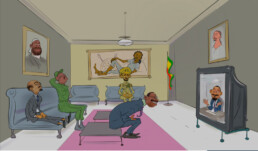Saving Face: Upholding the U.N. Image to the Detriment of Whistleblowers
Month: November 2021
Tinbite Elias
University of Redlands
Twitter : @TinaLegesse
Whistleblowing has long played an essential role in exposing corruption or wrongdoings by systems where internal monitoring mechanisms have failed. It serves as a tool, though to the detriment of the whistle-blower, to unmask and give the general public an understanding of how and why internal control mechanisms have failed. One must pay closer attention when the United Nations, an entity with varied organs that operates in nearly every nation, fails to meaningfully address concerns and accounts of whistleblowers.
One must pay closer attention when the United Nations, an entity with varied organs that operates in nearly every nation, fails to meaningfully address concerns and accounts of whistleblowers.
The most recent incident that has caught public attention is that of Maureen Achieng, the International Organization for Migration’s (IOM) Chief of Mission to Ethiopia, and Dennia Gayle, Representative at United Nations Population Fund (UNFPA). In an interview with an independent journalist, Jeff Pearce, these two high-ranking UN officials discuss irregular reporting channels established in the months following the onset of Ethiopia’s Tigray conflict in November of 2020. They explain that due to increased humanitarian need, more coordinators were brought into the region to meet the affected population’s needs. However, according to Achieng and Gayle, these new personnel regularly bypassed the existing chain of command, which includes country representatives, and reported directly to U.N. headquarter offices in New York and Geneva.
This unconventional side-lining of heads of agencies hints at the greater internal procedural struggle within the U.N. system. Their account sheds light on the ringing question of alligences in a complex conflict between the elected government of Ethiopia, and the presently recognized terrorist group, the Tigrean People’s Liberation Front (TPLF) who became the defacto administrators of Tigray, and the relief efforts therein. Achieng and Gayle were both placed on administrative leave under a citation of “unauthorized interviews’’ on October 11th and 12th respectively.
What are the United Nation’s own whistleblower policies?
The United Nations claims to extend protection to all staff members, regardless of type of appointment and duration. The policy considers protected activities to be reporting and cooperation pursuant to ST/SGB/2017/2/ Rev.1 where protection is provided when an evidence based report is made internally to the United Nations Ethics Office in good faith and within a 6 month period since awareness of misconduct. The U.N. also allows for external mechanisms of reporting when the reporting is necessary to avoid threats to public health and safety, damage to U.N. operations are eminent, the aforementioned misconduct is in violation of national or international law, or when internal mechanisms prove insufficient.
Though the regulation is extensive, misalignment between policy and practice demonstrates that protection is not guaranteed to those that undermine the greater institution. In fact, a 2015 U.N. report exposed that between 2006 and 2014 the Ethics Office evaluated 403 cases but established only 4 as retaliatory. This outcome left 55% of staff believing there would be little to no protection of whistle-blowers resulting in diminished confidence of the internal reporting mechanism.
The following three high profile whistleblower cases (James Wasserstrom, Miranda Brown and Emily Reilly) illustrate why there is staff reservation against reporting, and flaws with the implementation of the whistleblower policy of the U.N.
In 2007 James Wasserstrom, while serving as the head of the U.N. Office for the Coordination of Oversight of Publicly Owned Enterprises in Kosovo, reported concerns of corruption between senior U.N. officials and top politicians over a proposed power plant and mine. His action was met with retaliatory measures like non-renewal of employment contract and the closure of his office which he took to the Ethics office.
However, Wasserstrom’s claims were dismissed by a secondary evaluation system (U.N. Investigation Division) forcing him to take the case to the U.N. Dispute Tribunal in 2009. By 2012 his case was resolved with compensation of 65,000 (USD) in damages. It’s important to note the time it took the U.N to process cases and equally important that the measures taken prove to not be heavy enough deterrents for international organizations to refrain from future misconduct. Conversely, the consequences paid by whistleblowers are careerlong.
What is clear with these precedents is the converse relationship between weak deterrents for the institution
contrasted with long term reprisal for whistleblowers cultivating a culture of fear and acceptance of wrongdoing.
Another such case is that of, Miranda Brown who in 2014 was the Director of the Africa Branch at the United Nations High Commissioner for Human Rights (OHCHR). At the time, her office received a report from a human rights officer in Bangui, CAR in which he documented sexual abuse of young boys in an Internally Displaced Persons camp by U.N. peacekeepers. Brown and her then supervisor, Anders Kompass, forwarded this report to OHCHR in Geneva but saw no measures taken to rectify the situation. Thus in July 2014, Kompass and Brown disclosed the allegations of abuse to French authorities and law enforcement. Within months, Brown was terminated and Kompass suspended pending an internal investigation. Though Brown’s claims were validated by an independent panel convened by Member States, she was blacklisted and her contract never renewed.
Similarly, Emily Reilly, while working at OHCHR in 2013 received an email in which she was asked by Chinese officials to turn over names of human rights defenders who planned to attend a Human Rights Council (HRC) meeting in Geneva. Believing the request to be against OHCHR mandate and HRC rules, she reported her concerns to her seniors but learned the names were already handed over. The misconduct occurred to limit mistrust between China and the agency. Challenging this action resulted in reprisal in the form of exclusion from meetings, dissemination of false reporting and performance reviews which included false and prejudicial information. After 5 years of engaging with the Ethics Office, Reilly is recognized as a whistleblower, however she still has multiple active proceedings and was terminated from the U.N. mid November of 2021.
What is clear with these precedents is the converse relationship between weak deterrents for the institution contrasted with long term reprisal for whistleblowers cultivating a culture of fear and acceptance of wrongdoing. Organizations that have the power to validate and redefine misconduct, are inept at implementing sufficient protection of those that expose the corruption of the institution itself. Such is the case of Achieng and Gayle where their act of whistleblowing was redefined as an unauthorized interview. Achieng and Gayle’s case is still unfolding. Thus far, both officials have been placed on administrative leave and have been recalled from Ethiopia. The different U.N. agencies involved have distanced themselves from the officials citing the recording as antithetical to U.N. principles and values. Unlike the email evidence Reilly gathered, Achieng and Gayle can only refer to a timeline signifying change in normal operating procedures and the hearsay that the sidelining is due to assumed political preference.
Though it is yet to be determined if the UN regards Maureen Achieng and Dennia Gayle as legitimate whistle-blowers, granting them the protection they deserve, the Ethiopian public is witness to two major pitfalls. One, the fact that questions of corruption were raised by high ranking officials where the greater UN was accused of taking a political stance which might affect the outcome of a war; raising issues of sovereignty, and the unintended outcome of international interventions in protracted conflicts. Secondly, that challenging the status quo is not without repercussions, even in an internationally trusted body like the U.N.
The U.N. is burdened to not only uphold the standards but to be a bastion of good practice. Ethiopians and Africans alike, have made their protests public over Achieng and Gayle’s removal through the hashtag “#IamMaureenAchieng”. This timely public outcry maybe the only path of action the public has to protect whistle-blowers, but it might also serve as a wake up call for the U.N. to re-evaluate its policy as reservation towards international aid and development agencies continues to rise.
Share
Western Framing Ethiopia’s Tigray Crisis
Month: November 2021
Bethlehem Mehari
International Economics and
Conflict Management
Twitter : @Beth_Mehari
The West has long seen African political development through a myopic lens of self-interest and suspicion. A fact made all the more evident in how Western governments, and their media, frame African political development; be it transition or turmoil. Political upheavals and security deterioration in countries like Libya and Somalia are often discussed within the scope of migration, or the socioeconomic threat they pose to the West. While self-interest at the core of Western diplomacy is not inherently harmful to African States, the conflict in Ethiopia’s Tigray region elucidates the potential dangers of Western partisanship in Africa’s political development. In the case of Ethiopia, we have witnessed coercive diplomacy through individual sanctions by states outside of the multilateral framework.
Since the onset of conflict prompted by attacks on military stations in Ethiopia’s Tigray region on November 4th, 2020, the United States and the European Union have adopted a strategy of consistent pressure on the Ethiopian government and sought partners in the Horn Region to find a solution to the crisis. The mainstream media, including those under the congressionally funded Corporation of Public Broadcasting (CPB), news publications (Washington Post, Reuters, the Economist, Foreign Policy) as well as notable human rights watchdogs like Amnesty International have all followed suit.
These strategies have also led to the emergence of a parallel narrative of the conflict
Ethiopians, citizens and officials alike, have spent the better part of a year addressing accusations levied against the nation primarily from the United States, Europe, the mainstream media, as well as international agencies, notably UNDP, WFP, and UN Women that that have persistently called for a cessation of hostilities on humanitarian grounds. While many claim that the West harbors a nefarious plot to weaken Ethiopia’s central government, others maintain that there is simply an ignorance of the facts on the ground.
While the motivation of the United States and the European Union requires closer scrutiny, it is important to identify recurring strategies Western powers and media employed that have prolonged the conflict and increased human suffering in Tigray and neighboring Amhara and Afar regions. These strategies have also led to the emergence of a parallel narrative of the conflict. Hence, instead of further entrenchment into the cyclical pattern of offense and defense pattern, let us examine recurring themes in the West’s framing of Ethiopia’s Tigray crisis.
In identifying recurring themes in the west’s approach to the conflict, ordinary people as well as government officials will break away from the unproductive cycle of offense and defense.
Deny, Deny, Deny
Since the onset of conflict in November of 2020, the question of “who initiated the war” has grown increasingly vague. Though high-ranking TPLF officials like Sekoture Getachew, Getachew Reda, and General Tsadkan Gebretensae, have not only declared their role in initiating hostilities but have also professed their opposition of the governing party and stood in opposition of the continued statehood of Ethiopia; a disclosure that has caused public confusion and turmoil domestically. Inquiries as to “who initiated the war” would have been a laughing matter in the early days of November 2020. However- the global media machinery, as well as Western powers have effectively muddied the waters in their endeavor to rationalize TPLFs motivations in not only initiating the conflict but also prolonging it. The United States, and most notably Ireland, seem to have tabled this important detail in their crusade for humanitarian access.
This is only the start of a series of denials that have baffled the Ethiopian public. Though the likes of the Associated Press and the New York Times have produced sensational pieces on details like recruitment of child soldiers and potential combatants in UN refugees camps in Sudan,
there is barely an acknowledgment of the use of child soldiers, or UN Refugee Agency arguably abetting combatants. Equally, after the Government’s announcement of a unilateral withdrawal. Many in the international community seem oblivious to TPLF’s incursions into Afar and Amhara regions. We have, instead, seen the use of vague terminology like “expansion of the war” to imply further culpability of the Federal Government.
Deflect
Owing to the public outcry on social media platforms, the United States has sought to rationalize some of TPLF’s actions as a response to “a siege”. Criticism for the diverting aid materials for recruitment, use of child soldiers, and guerilla-style attacks on innocent neighboring communities have all been attributed to the Federal Government’s refusal to open its borders. This refusal to acknowledge TPLF crimes, while magnifying the Federal Government’s legitimate measures, is designed to further exacerbate the war and keep the public in a perpetual blame game.

Delegitimize
Minimizing the undisputed legitimacy of the ruling government, the United States and the EU have levied all their accusations at the foot of a single individual, the Prime Minister. The United States and many EU states are yet to acknowledge Ethiopia’s relatively free and fair elections in June of 2021; it is likely for this reason that they continue to seek partners in the region without meaningfully engaging the elected government of Ethiopia. . Additionally, there is a marked shift toward a cold-war era dynamic where the Tigray conflict is discussed within the scope of a Chinese expansion or the growing influence of Russia in East Africa. Secondly, deliberate tarnishing of Ethiopian institutions like the ENDF, the Office of the Prime Minister, and Ethiopia’s Human Rights Commission is yet another attempt to Delegitimize the Government of Ethiopia.
Disinform
The unilateral withdrawal of federal troops is a noteworthy incident of deliberate disinformation. Following the West’s outcry for cessation of hostilities, the withdrawal of federal troops was depicted in one of two ways. First, that the central government was severely weakened to carry out military activities. And second, that withdrawal of federal forces is a de facto siege imposed on the Tigray Region; thereby justifying TPLFs operations in Afar and Amhara regions. This deliberate change in narrative angered the Ethiopian public as it conveniently masks the plight of over two million victims of TPLF violence in the Amhara and Afar regions. The United States embassy in Addis Ababa is yet another actor that continues to disseminate unsubstantiated reporting on the nation’s safety and security which only serves to stoke panic.
So, why is it important to identify these deliberate strategies deployed by Western powers and their media machinery? First, the people need to regain their voice in a conflict where many claim to speak on the Ethiopian People’s behalf. In identifying recurring themes in the west’s approach to the conflict, ordinary people as well as government officials can break away from the unproductive cycle of offense and defense. Instead, the nation can collectively move toward a much-needed national dialogue rooted in firm principles: both of the Ethiopian legal code as well as customary international law.
Secondly, instead of rectifying factually inaccurate international reporting and levying accusations on foreign governments, the Ethiopian public needs to hold its own elected officials responsible, including demands for increased access to information and greater transparency.
Ethiopian leadership through the ages. Confronting or conforming to the past?

Share
Conversation with Dr. Tirusew Asefa
Month: November 2021
Climate and water resources expert based in Florida
HORN REVIEW:Dr. Tirusew, thank you for taking the time to speak with us on the topic of the Grand Ethiopian Renaissance Dam (GERD) and the issues surrounding it. Please give our readers a summary of your background.
Thank you for having me. I primarily work with a water company that supplies nearly 2.4 million residents in the Tampa, Petersburg- Clearwater Metro Area. More specifically, I work in a department that aids with modeling and decision support in areas like water demand projections for the next 20-30 years, demand and supply-side management of the various water sources, as well as assessments of the impact of climate change on water resources. Additionally, I give a brief course at the University of South Florida in the areas of water demand and supply management, forecast, and immediate effects of climate change. I also teach a postgraduate course on water, energy, and climate at Pan-African University’s Algeria campus. In this course, I give an overview of adverse effects of climate change like floods, and drought, and effective measures of combating them.
HORN REVIEW:As a climate and water resource management expert, summarize for us the core benefits of a hydro-powered dam as compared to other sources of energy like fossil fuel and nuclear power.
From a clean energy perspective, there are numerous benefits. While some emphasize the negative aspects like carbon and methane emissions after filling reservoirs; these effects, however, are negligible compared to emissions from fossil fuels and other energy resources used around the world. In terms of reducing emissions, hydropower is the cleanest. In this aspect, a project like GERD is not only helpful to the country but also to the world as it helps curb global emission levels. Ethiopia has six more tentative projects that are to generate an additional 25,000 megawatts of energy and help meet the population’s demands.
A project like GERD also has immense benefits both in terms of employment and engaging local communities. Thus far, the emphasis on labor has been on the construction of the dam itself.
However, one would expect further job creation in the construction and maintenance of power infrastructure that is to distribute electricity throughout the nation.
I recently had a conversation with a young lady in high school and I inquired into her future career aspirations. To my surprise, she answered that she hopes to become an electrical engineer as she foresaw the immense labor and expertise needed to meet and sustain our population’s electricity needs. Studies have shown that Ethiopia can easily double its output from its existing light industry solely by having a consistent electricity supply. Experts have also projected that every dollar invested in electricity generation, has an additional $7 worth of associated benefit because of its cascading effect across sectors.
HORN REVIEW:What, in your opinion, accounts for the disconnect between the global move towards environmental consciousness and lack of support, financial or political, for clean energy initiatives in developing countries like Ethiopia. What accounts for this disconnect?
I believe this disconnect has a lot to do with the will and profit margins of special interest groups and goliath-sized lobby firms. It is no secret that many of the industrialized nations spearheading the global effort for clean energy continue to be large emitters with no foreseeable plans to change their path. With this reality in mind, I am also a firm believer that clean energy initiatives should never be at the cost of the poor. The cost of transitioning to clean sources of energy should be shared with nations that have achieved industrialization decades ago. This is akin to changing the rules of the game in one’s favor. Africa’s combined emissions, per capita, remain minuscule as compared to other nations and corporations, hence the international framework has to be one of practical assistance and not one of dictation of rules.
It is no secret that many of the industrialized nations spearheading the global effort for clean energy continue to be large emitters with no foreseeable plans to change their path.
HORN REVIEW:How would you summarize some of the terms in the ongoing GERD negotiations? What are the buckets of issues?
The issues are different for both Sudan and Egypt and they need to be addressed separately. I do not believe Sudan disagrees with the benefits it would reap from GERD. Sudan would like to be assured that it would get a consistent supply of water throughout the year given that nearly 70% of Blue Nile water flows in a mere 4 months. Due to this fact, Sudan faces recurrent floods during these months. For example, the 2019 flood in Sudan is considered a once in a 100-year flood; coincidentally, 2019 was the year Ethiopia completed its first filling of the GERD reservoir. Sudan not only needs assurances that there will be regulated flow, but also information on the amount of water released given that their nearest dam only retains about 7 billion cubic meters.
HORN REVIEW:What is the alternative to Sudan’s two concerns without the GERD?
GERD ensures that Sudan will face significantly fewer floods if any. Without it, Sudan would continue to manage extreme floods. And concerning information on water levels, well- they simply would not have any without GERD. As far as I know, the Ethiopian government does not object to Sudan’s demands. However, Egypt’s demands are far more demanding and non-reciprocal as they are not only asking for daily, monthly, and annual data- but they also demand reports on water quality levels. However, Egypt seems unwilling to share similar data on the water that reaches them. Contrary to Egyptian claims, I argue that we do not even know just how much water is reaching Egypt and the amount that is in the Nile basin as a whole. Though Egypt has always maintained that the total amount is close to 85 BCM, Satellite information suggests that it is no less than 97 BCM.
Additionally, Egypt’s core demand has to do with extended periods of drought periods and their demands to have a fixed amount of water released permanently. A binding agreement would dictate the amount of water Ethiopia should release ad infinitum; irrespective of climate change which equally affects Ethiopia, increasing needs for potable water, or national interests for commercial agriculture. Experts will tell you that one would need a few billion gallons of water to use for mass agricultural production; given that the GERD is located at the cusp of the Ethio-Sudanese border, this would mean that Ethiopia’s potential for such endeavors would adversely impact its own power generation. Instead of cooperating on combating water shortage due to factors like climate change and recurring droughts, Egypt’s terms essentially force Ethiopia to release a fixed amount of water, thereby acting as Egypt’s secondary reservoir. As I said, Ethiopia will not deliberately use excess amounts of water upstream of the GERD precisely because it severely reduces the water supply that is meant to go into the turbines for power generation. If Egypt’s suspicions were valid, GERD would be located further inland to facilitate an exorbitant level of agricultural productivity. Their terms are meant to limit Ethiopia’s ambitions to power generation by cornering the current government into disavowing any future ambitions of using the Nile waters for consumptive purposes.
A binding agreement would dictate the amount of water Ethiopia should release ad infinitum;
HORN REVIEW:What confidence-building measures do you propose to build trust between the three nations and their respective populations?
It is important to note that this issue should not be seen as a political issue, but as a people-to-people issue. It is important to frame the larger water story and how it fits into the larger social, economic, and political context of the three countries. What we are seeing is the contrary; politicians and media personalities have politicized the project and seem to be the drivers of this conversation. It is also the responsibility of the professionals to clearly articulate the larger water story and contextualize it in terms of water, food, and energy security for all three nations.
It is important to frame the larger water story and how it fits into the larger social, economic, and political context of the three countries.

